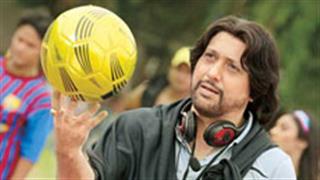Decades after veteran Tamil actor M.G. Ramachandran blazed a trail to the chief minister's chair, cinema is still a springboard into the world of Indian politics.
In a country which makes more movies than any
other, where cinema stars are demi-gods to millions of fans, there is no stopping actors joining the established political parties or setting up one of their own.
But not everyone takes the plunge into politics with the sound and fireworks that accompanied the rally of one million people which Telugu superstar Chiranjeevi addressed in the temple town of Tirupati in Andhra
Pradesh Tuesday.
It is a pan-India phenomenon. But where actors - male and female - have made it big in southern India, their counterparts from the north remain on the fringes of politics, notwithstanding their individual appeal.
"Unlike in the south, actors in north India like Amitabh Bachchan, Dharmendra and Rajesh Khanna don't bring with them any new aspiration, " political analyst Mahesh Rangarajan told. "They don't represent regional
nationalism. They are not a success."
The three biggest success stories of film stars-turned-politicians are from the south: the late N.T. Rama Rao or NTR in Andhra Pradesh and the late M.G. Ramachandran or MGR and AIADMK leader Jayaram
Jayalalitha in Tamil Nadu.
MGR started off as a Congress worker, shifted his allegiance to the DMK and, after differences with DMK leader M. Karunanidhi, founded the AIADMK. The charismatic MGR was the Tamil Nadu chief minister for a
decade until his death on Christmas eve in 1987, an event that led to mass suicides by fans mourning his death.
Jayalalitha, who acted with MGR in numerous films, remains not only a potent force in Tamil Nadu but is increasingly playing a much larger role in national politics.
Chiranjeevi, the 53-year-old veteran of 150 movies, could prove to be another NTR, say his admirers.
Why do film stars take to politics? Why sacrifice a life of comfort for an uncertain turbulent world called politics?
"I feel that a lot of stars join politics because they are swayed by others. They are told they are popular, so they can join politics, " pointed out Aruna Vasudev, founder-editor of Cinemaya, a film magazine.
"I feel it depends upon the individuals and their motivation, " she says on the success, or mostly the lack of it, of Hindi film stars.
Political commentator, satirist and former MP Cho S. Ramaswamy is not surprised at Chiranjeevi's decision to try to turn his popularity as film hero to political advantage.
"People all over India are looking for alternatives to existing power set-ups, so Chiranjeevi's entry into politics comes as no surprise, " he said.
The biggest of stars to take to politics from the north was Amitabh Bachchan. But he gave it up within a short period and has declared that he will never again try to be a politician.
The legendary Sunil Dutt was with the Congress for a long time until his death in 2005. Vinod Khanna, Dharmendra and Hema Malini are MPs with the Bharatiya Janata Party (BJP). Raj Babbar was for years with the
Samajwadi Party, whose two key MPs today are Jaya Badhuri and Jaya Pradha.
Rajesh Khanna has been a Congress MP but has now virtually given up politics. Shatrughan Sinha remains with the BJP, but comes alive only when elections are called. Govinda is a Congress MP from
Maharashtra.
Tamil star Vijaykant is the latest to make a dent in Tamil Nadu's star-studded politics. The state's Chief Minister M. Karunanidhi of DMK has had a long association with cinema - as a script writer.
Shivaji Ganesan, another cine legend in Tamil Nadu, was also a long-time Congress supporter but never came anywhere to tripping MGR. Rajnikant, who is another Tamil star, has never hidden his political ambitions.
Why do some actors succeed in politics where others fail?
Answers Aruna Vasudev: "Amitabh Bachchan was a disaster, but Sunil Dutt was so good as a politician. Maybe because Amitabh's heart was not in it whereas Sunil Dutt was always concerned about social issues."
Actors are also roped in by political parties, mainly the Congress and the BJP, more for their glamour quotient and crowd-pulling ability than any firm commitment to social causes.
"That is why one sees stars from the Hindi film world mostly only during elections, " said M. Mallikarjun, a retired professor of Indian history in Bangalore.
A leading writer on films who requested anonymity said: "For some stars approaching retirement as actors, politics is a surefire way of extending their public life. For the more serious star-politicians, it's a way of using
their popularity to further a political agenda. But only the really committed succeed, " he added.
Analyst Rangarajan noted that many south Indian film personalities in politics were not from the dominant castes. "In south India, these actors bring with them a regional nationalist flavour and try to fulfil middle class
aspirations."
Also in the south, cine stars have huge fan clubs and these fans turn into grassroot cadres.
While some analysts expect Chiranjeevi to succeed a la NTR, others warn of road blocks.
Cho Ramaswamy cautioned: "While Chiranjeevi may gather a sizeable number of votes, it has to be remembered that he will have to face two well-entrenched political outfits - the Congress and TDP (Telugu Desam
Party).
"If one has to go by the law of averages, indications are that Chiranjeevi may split the anti-Congress votes as he is projecting himself as a clear contender for the chief minister's post and actually end up helping
TDP."
Malayalam superstar Mammootty says Chiranjeevi appears to have made a very good beginning.
"The biggest advantage Chiranjeevi has is that he is a very straight person, and corruption would be the last thing in his mind. He has enough money otherwise."
Stars ride on fame - from box office to ballot box
Friday, August 29, 2008 12:54 IST



















